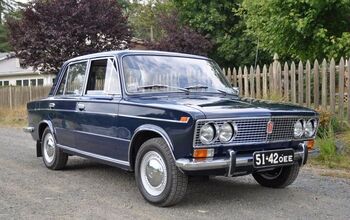Russia And The Politics Of Car
When cars and politics collide, the results are rarely pretty. No wonder the political discussions here at TTAC so often rate amongst our most heated and community standards-challenging. Modern cars are machines of great power, facilitating a great deal of freedom but also carrying undeniable consequences, and their position in modern society demands a constant re-evaluation of their terms of use. Some of TTAC’s gripes on car-related policy may lead some to believe that we harbor ulterior political motivations for our coverage, but the truth of the matter is that our principles are simple and directly car-related. If our political coverage sometimes seems petty, it’s because American motorists have relatively little to complain about. In Russia, however, motorists find themselves under assault by import bans, draconian tax increases and corrupt traffic police. And as the New York Times documents, it takes a lot to push motorists into political awareness, but once pushed their eloquent defense of their automotive rights is nothing short of inspirational.
When motorists gather for a meeting, they don’t come out with political slogans. We have no ideology. It’s a revolt of people who are not satisfied — not for political reasons, not because our salaries have not been paid — but because something sacred has been taken from us, our car.
So says one Kiril Formanchuk, a lawyer who helped organize a campaign against traffic police corruption in Yekatrinburg. His cause, combined with last year’s Vladivostok anti-car-import-ban riot and opposition to a proposed doubling of car ownership taxes have galvanized motorists as a political class. So potent is their middle-class rage, that President Dimitri Medvedev recently overturned the proposed tax increase, against the wishes of his party United Russia and its leader, Vladimir Putin. In a country like Russia, where opposition is scarcely tolerated, this represents a rare concession by the ruling party. Opposition commentators have taken notice of this chink in the Kremlin’s armor, and are embracing the newly politicized motorists. Yuri Gladysh of the opposition site Kasparov.ru explains the power of this new constituency.
For a car, a Russian will simply bite through the throat of a passer-by. I know plenty of shop owners who in their hearts are prepared, if the state takes their business away, to return to some office job, with their Soviet-era diploma. But I don’t know a single motorist who would silently agree to the infringement of his rights
To which Novaya Gazeta’s Yuri Geyko adds:
My biggest shock was that these people were not poor. This was the middle class. These people, they did not go out into the street because they have nothing to eat. They went out into the street because they have a future.
For all the rhetoric that surrounds the right to bear arms in the United States, few could deny that cars are a far more relevant tool for the cause of freedom. But the eloquent defense of any right is almost always born of extreme pressure. Let’s be thankful then, that Americans enjoy the freedom of the automobile to such an extent that we can remain ambivalent to its politics. Even if some of us choose not to.
More by Edward Niedermeyer
Latest Car Reviews
Read moreLatest Product Reviews
Read moreRecent Comments
- Jeff I have had about 6 recalls on my 2022 Maverick hybrid with most of them needing program updates other than that I really like my Maverick.
- Daniel J One thing to note: just because it's 240v doesn't mean the circuit can handle the load. How if a breaker trips and something important is on that breaker (lighting, sump pump... whatever). How if all the 240 receptacles are on the same circuit and two people charge at the same time?
- Redapple2 A slight twist of the topic. > A good reason to buy a car before they do a redesign (beyond teething problem for the newborns). Getting a car with the old tech. IE- vanishing Carplay. New subscription requirements. And doing away with switches and knobs and substituting a huge TV screen. I got a 2024 Forester because the 2025 moves everything to the new huge TV screen. A/C settings. Seat heat. All wheel drive modes etc. All in the TV screen. Some of it buried on page 3 of a submenu. No. Hard no. I m not participating in this.
- Lou_BC 2022 Colorado ZR2 diesel:1st year:I got a "low oil" warning the first few months of ownership. Dealer checked oil consumption every month for 6 months. No oil consumption. Probably incorrectly filled at factory and missed with PDI. AC did not work. Noticed that 2 weeks later during a hot spell. Local dealership lazy and just recharged system. They assumed GM factory screwed up. It leaked out and wasn't working after winter. Tech did a leak test and found problem. Sold without module that runs heated seats (chip shortage). I got a $50 refund and when parts showed up they inserted module. Repaired right before winter. DEF heater too weak to keep up with extended cold weather. ECU did threaten "limp mode". Dealer claims everything was working as designed. Multiple small dents in rear wheel wells close to plastic fender flares. Rock damage from driving on gravel roads. Factory wheel well liners are sh!t. GM spray in liner does not cover entire tailgate. Cheap bastards. 2nd year:DEF system froze up again. Service adviser said they sell more trucks in California than Canada. Get a heated garage. Rear brakes. Left rotor and pads fried at 50,000 km. Right side not quite to metal. I was told this was normal for Chevy trucks used offroad. Lost a rear shock guard. Poor design. Cheap. Diff vent line dislodged. Wheel design pretty but prone to rock chips and rock damage. Dented a rock slider on a big rock. Often find little pebbles in between plastic flares and metal fenders. Rear bumper seams also collect pebbles. Duratrac's are a decent all around tire but are too soft for extended time on gravel roads. Chewed up and very little tread at 60,000 km. Lost 1 tire to sidewall puncture. It definitely isn't as well built as my previous trucks. I seriously doubt I'd buy another Chevy. I like the truck overall. Love the diesel drivetrain.
- HotPotato Honestly VW should have bought Canoo too -- the Canoo is a much better rendition of a modern VW van than the actual VW EV van, which is just a standard generic Euro delivery van disguised by a vintage 2-tone paint job.


































Comments
Join the conversation
Steven Lang: Having lived in a village of the swanky Hamptons, where parking anywhere within the village limits between 1am and 5am is verboten, and where the monthly court session is swamped by people who received a summons because their tire touched the white stripe while parking, I look forward to your series on automotive fascism.
Problem is that Russian politician impose taxes on vehicles assembled outside of Russia. Therefore, many companies bring parts and assemble vehicles on Russian territory. Problem is that quality of said vehicles does not match original. I used to live in Ukraine. They had similar problem. As for people who used to bring vehicles from Europe for resale, there was age limit. So they found out way around it: buy registration from a vehicle after fire or accident, then import vehicle, but say it will be used for parts. After just update Ukrainian registration with VIN from a newly brought car.